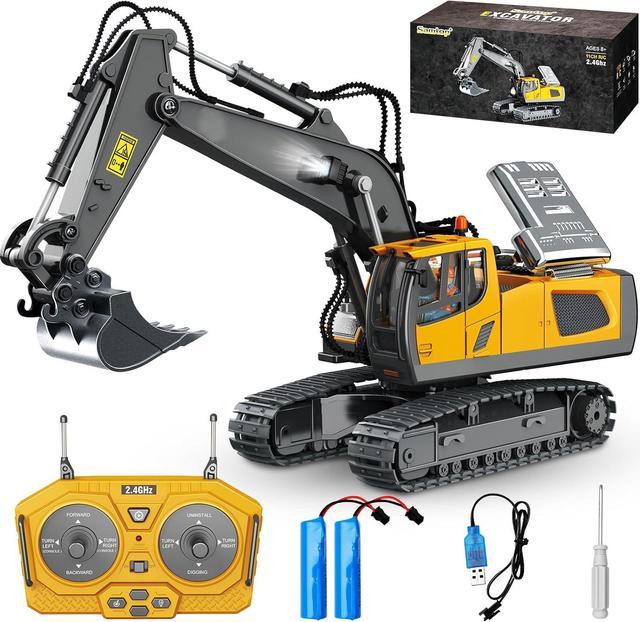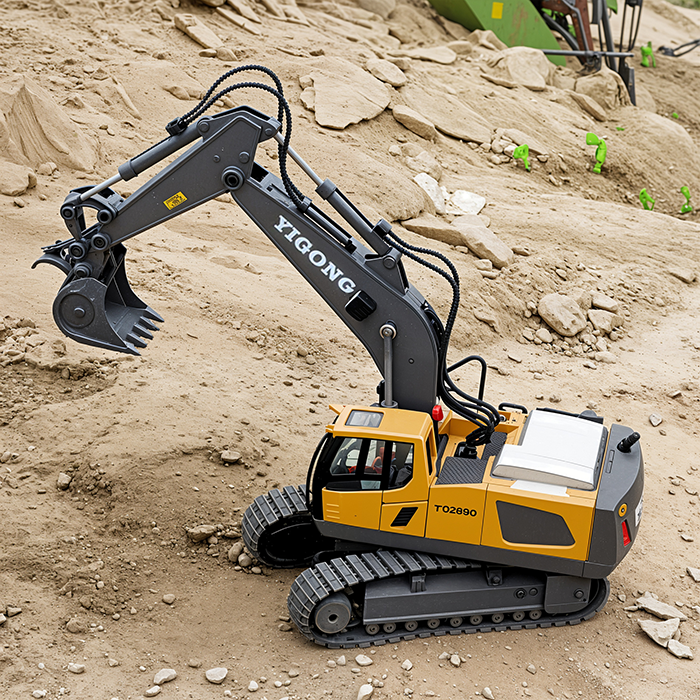Is the remote control excavator the Future of Construction? Let’s Find Out
Comprehending Just How Excavator Works and Its Effect On Efficiency
Excavators play a crucial role in building and construction and mining procedures, relying upon an intricate interaction of hydraulic and mechanical systems. Their capacity to execute a range of jobs depends upon both their layout and the modern technology incorporated within. Understanding these components can significantly affect operational performance and productivity. As developments remain to improve the industry, one should consider how these adjustments will certainly influence future methods and performance.
The Fundamentals of Excavator Mechanics

The Role of Hydraulic Solutions in Excavators
At the heart of excavator procedure lies the hydraulic system, which plays a pivotal role in powering the device's functions and activities. This system uses pressurized hydraulic liquid to move power, making it possible for different activities such as moving, excavating, and lifting. By using the principles of hydraulics, excavators can do tasks with exceptional accuracy and force, improving total functional efficiency.The hydraulic system includes crucial elements, including pumps, cylinders, and shutoffs, which collaborate to regulate the circulation and instructions of the fluid. When the operator involves the controls, the hydraulic fluid is guided to particular cyndrical tubes, converting the operator's commands into physical activity. This device enables responsive and smooth actions, which are necessary in construction and excavation settings. double e volvo rc excavator. The effectiveness of the hydraulic system directly affects the performance and flexibility of the excavator, making it an important component in contemporary excavation processes
Trick Parts of an Excavator
Recognizing the crucial parts of an excavator is crucial for understanding exactly how this effective device operates. An excavator is composed of numerous substantial components, consisting of the undercarriage, house, pail, boom, and arm. The undercarriage offers security and movement, frequently including wheels or tracks to browse numerous terrains. Your house contains the engine and hydraulic systems, permitting the driver to manage motion and power the machine. The boom expands from the home, enabling upright reach, while the arm connects to the container, promoting digging and lifting operations.Additionally, the taxi houses the driver, outfitted with controls for precise maneuvering. Each of these elements plays a vital role in the excavator's overall performance, contributing to its efficiency and performance on construction websites. Understanding these parts helps in keeping and optimizing excavator efficiency, guaranteeing jobs are finished securely and effectively.
Accessory Adaptability and Its Benefits
Attachment flexibility is an essential facet of excavators, making it possible for operators to change between various tools customized for specific tasks. This adaptability not only boosts work efficiency yet likewise adds to cost-effectiveness by reducing the need for several devices. Understanding the various kinds of add-ons readily available can substantially influence the overall efficiency and capability of an excavator on work sites.
Kinds of Accessories
While excavators are largely acknowledged for their excavating capacities, their real versatility depends on the vast array of add-ons available. These attachments boost the excavator's performance, permitting it to do different jobs beyond excavation. Usual accessories include containers (for digging and scooping), hydraulic thumbs (for grasping materials), and augers (for drilling openings) Grapples are made use of for moving and dealing with particles, while rippers can separate hard surfaces. Various other specialized accessories, such as trenchers and rakes, allow excavators to adjust to particular work requirements. This diversity not just raises the maker's energy throughout different sectors, consisting of demolition, landscape design, and construction, however likewise enables drivers to customize their tools to satisfy details task demands efficiently.
Increased Work Efficiency
Maximizing work performance is a primary advantage of utilizing various excavator attachments. Different accessories enable an excavator to do multiple tasks without needing to switch devices, saving beneficial time and labor. Using a hydraulic hammer can break concrete while a bucket attachment can dig deep into soil, making it possible for a seamless operations. This convenience lowers downtime linked with tools changes and enhances efficiency on-site. Furthermore, specialized attachments improve precision in jobs such as grading or landscape design, leading to better results. The capacity to adjust to various task requirements not just enhances procedures but likewise decreases the requirement for extra equipment, making sure that projects are completed quickly and effectively. Generally, add-on convenience substantially adds to increased job performance in excavation work.
Cost-Effectiveness and Convenience
Cost-effectiveness is a substantial benefit of utilizing flexible excavator add-ons. These accessories permit a solitary excavator to execute several tasks, reducing the demand for added equipment and labor - double e volvo rc excavator. By changing in between buckets, hammers, and grapples, drivers can deal with numerous tasks, from digging to demolition, consequently making best use of equipment application. This adaptability not only decreases operational costs however likewise lessens downtime connected with changing tools. In addition, the ability to personalize excavators with specialized accessories enhances productivity, as they can efficiently manage varied jobs according to job demands. To conclude, the mix of cost-effectiveness and adaptability in excavator accessories adds to boosted operational performance and source allowance in building and excavation jobs

Advanced Modern Technology in Modern Excavators
Modern excavators are progressively equipped with advanced technology that changes excavation processes. Automation simplifies operations, while boosted fuel performance reduces functional costs. Additionally, wise control systems boost accuracy and security, noting a considerable advancement in excavation equipment.
Automation in Excavation Processes
As excavation modern technology progresses, automation has become a crucial component in improving efficiency and accuracy on work websites. Modern excavators are equipped with innovative automated systems that help with tasks such as grading, digging, and trenching with minimal driver treatment. These systems utilize sensors, GPS, and equipment discovering algorithms to ensure precise positioning and deepness control, considerably decreasing the margin for mistake. In addition, automation allows drivers to concentrate on strategic decision-making instead of hands-on controls, causing boosted efficiency overall. Such innovations not only improve process but also enhance safety and security by decreasing human error in complicated operations. As a result, the integration of automation in excavation procedures stands for a significant advancement in building modern technology, driving the industry in the direction of better efficiency and effectiveness.
Boosted Fuel Performance
Advancements in innovation have actually additionally led to considerable improvements in gas efficiency for contemporary excavators. Modern makers are furnished with innovative engines that maximize power result while reducing fuel intake. These engines use innovative burning modern technologies, such as turbocharging and straight gas shot, to boost efficiency and performance. Furthermore, light-weight products in construction decrease total weight, permitting much less energy expenditure throughout operation. The introduction of variable rate controls enables operators to adjust engine performance according to specific tasks, better minimizing fuel usage. Consequently, these enhancements not just lower operational expenses but additionally add to ecological sustainability by reducing discharges. On the whole, boosted gas efficiency in helpful resources excavators is an important advancement that strengthens productivity and financial practicality in the building market.
Smart Control Solution
While drivers browse significantly complex work sites, clever control systems in excavators have actually emerged as necessary tools for boosting effectiveness and precision. These advanced modern technologies use sensors and algorithms to check numerous specifications such as load weight, surface problems, and operational efficiency. By immediately adjusting hydraulic functions, smart systems optimize maker performance, leading to improved productivity and reduced wear on elements. In addition, operators take advantage of intuitive interfaces that supply real-time responses and diagnostics, permitting for informed decision-making. This integration of innovation not only streamlines procedures yet also decreases human error, adding to safer workplace. As the building and construction market proceeds to evolve, clever control systems will certainly play an essential role fit the future of excavator efficiency and efficiency.
Enhancing Operational Performance With Excavators
Excavators play an essential role in improving functional effectiveness across numerous building and construction and excavation projects. Their versatility allows for several jobs, consisting of material, excavating, and training handling, which improves operations and minimizes the need for additional equipment. With powerful hydraulic systems, excavators can do sturdy jobs with precision, significantly reducing the moment required to full tasks. The assimilation of sophisticated modern technology, such as general practitioner and automated controls, better enhances their operation, enabling operators to accomplish better precision and reduce product waste. In addition, modern-day excavators are designed to take in less gas and minimize discharges, adding to both expense savings and ecological sustainability. By using excavators effectively, building groups can boost efficiency, satisfy project deadlines, and improve overall site administration. This multifunctionality and efficiency make excavators indispensable devices in the contemporary building and construction landscape.
The Future of Excavators in Building And Construction and Mining Industries
As the building and mining markets evolve, the future of excavators is poised for significant change driven by technical advancement and altering operational demands. Advancements in automation and synthetic knowledge are improving excavator capabilities, permitting enhanced accuracy and effectiveness in operations. Autonomous excavators are emerging, minimizing the demand for human treatment and decreasing the risk of accidents.Moreover, the assimilation of telematics and IoT technology allows real-time surveillance of maker performance and anticipating upkeep, optimizing uptime. Environmentally friendly layouts, including electrical and hybrid versions, are getting grip, straightening with sustainability goals within the industry.Additionally, the usage of sophisticated materials and lighter styles boosts gas efficiency while keeping performance criteria. As these fads progress, excavators will certainly play an essential function in satisfying the raising needs for performance and safety in building and construction and mining, ultimately changing operational landscapes.
Regularly Asked Concerns
How Do Climate Condition Influence Excavator Efficiency?

Weather considerably affect excavator efficiency, as rainfall and mud can hinder traction and stability, while extreme temperatures might impact hydraulic systems. Operators needs to adjust to these variables to assure perfect performance and safety during procedures.
What Precaution Should Operators Adhere To While Using Excavators?
Safety steps for excavator operators include wearing ideal individual protective tools, carrying out pre-operation examinations, making sure correct communication with ground employees, maintaining a safe distance from overhead risks, and adhering to well-known operational protocols to protect against accidents.
Exactly How Usually Should Excavators Be Kept for Optimum Performance?
Excavators click for info must be preserved on a regular basis to guarantee peak performance, usually every 250 operating hours or as defined by the producer. Regular checks boost reliability, stop unforeseen malfunctions, and extend the life-span of the devices.
What Is the Average Lifespan of an Excavator?
The typical life-span of an excavator generally ranges from 10,000 to 15,000 hours of procedure. Variables affecting long life include maintenance methods, operating conditions, and the top quality of the equipment itself, influencing overall efficiency and efficiency.

Can Excavators Operate Irregular Terrain Effectively?
Excavators can operate effectively on irregular terrain as a result of their articulated layouts and flexible tracks. These features allow them to preserve stability and traction, allowing efficient operation in challenging atmospheres commonly experienced in building and construction and landscape design jobs. Each of these components plays a crucial function in the excavator's total functionality, contributing to its performance and performance on building and construction sites. Maximizing work performance is a key benefit of using different excavator accessories. While drivers browse increasingly intricate work sites, clever control systems in excavators have emerged as important devices for enhancing performance and precision. Excavators play a necessary role in improving functional efficiency across numerous building Learn More and excavation tasks. Breakthroughs in automation and man-made intelligence are reshaping excavator abilities, permitting for improved accuracy and performance in operations.